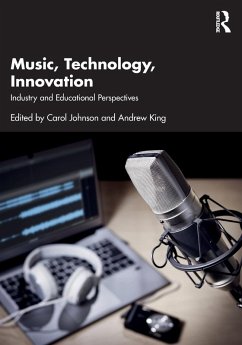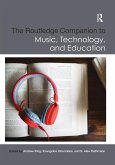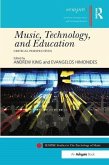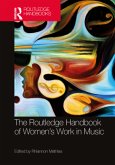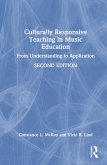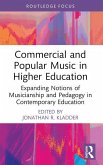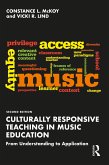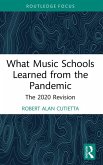Music, Technology, Innovation
Industry and Educational Perspectives
Herausgeber: Johnson, Carol; King, Andrew
Music, Technology, Innovation
Industry and Educational Perspectives
Herausgeber: Johnson, Carol; King, Andrew
- Broschiertes Buch
- Merkliste
- Auf die Merkliste
- Bewerten Bewerten
- Teilen
- Produkt teilen
- Produkterinnerung
- Produkterinnerung
Music, Technology, Innovation: Industry and Educational Perspectives draws upon cutting-edge practice in the use of technology from both a pedagogical and industry perspective.
Andere Kunden interessierten sich auch für
![The Routledge Companion to Music, Technology, and Education The Routledge Companion to Music, Technology, and Education]() The Routledge Companion to Music, Technology, and Education64,99 €
The Routledge Companion to Music, Technology, and Education64,99 €![Music, Technology, and Education Music, Technology, and Education]() Music, Technology, and Education41,99 €
Music, Technology, and Education41,99 €![The Routledge Handbook of Women's Work in Music The Routledge Handbook of Women's Work in Music]() The Routledge Handbook of Women's Work in Music47,99 €
The Routledge Handbook of Women's Work in Music47,99 €![Culturally Responsive Teaching in Music Education Culturally Responsive Teaching in Music Education]() Constance L. McKoyCulturally Responsive Teaching in Music Education153,99 €
Constance L. McKoyCulturally Responsive Teaching in Music Education153,99 €![Commercial and Popular Music in Higher Education Commercial and Popular Music in Higher Education]() Commercial and Popular Music in Higher Education30,99 €
Commercial and Popular Music in Higher Education30,99 €![Culturally Responsive Teaching in Music Education Culturally Responsive Teaching in Music Education]() Constance L. McKoyCulturally Responsive Teaching in Music Education46,99 €
Constance L. McKoyCulturally Responsive Teaching in Music Education46,99 €![What Music Schools Learned from the Pandemic What Music Schools Learned from the Pandemic]() Robert CutiettaWhat Music Schools Learned from the Pandemic71,99 €
Robert CutiettaWhat Music Schools Learned from the Pandemic71,99 €-
-
-
Music, Technology, Innovation: Industry and Educational Perspectives draws upon cutting-edge practice in the use of technology from both a pedagogical and industry perspective.
Produktdetails
- Produktdetails
- Verlag: Taylor & Francis Ltd
- Seitenzahl: 308
- Erscheinungstermin: 3. Dezember 2024
- Englisch
- Abmessung: 254mm x 178mm x 18mm
- Gewicht: 610g
- ISBN-13: 9780367485252
- ISBN-10: 0367485257
- Artikelnr.: 70291783
- Herstellerkennzeichnung
- Libri GmbH
- Europaallee 1
- 36244 Bad Hersfeld
- gpsr@libri.de
- Verlag: Taylor & Francis Ltd
- Seitenzahl: 308
- Erscheinungstermin: 3. Dezember 2024
- Englisch
- Abmessung: 254mm x 178mm x 18mm
- Gewicht: 610g
- ISBN-13: 9780367485252
- ISBN-10: 0367485257
- Artikelnr.: 70291783
- Herstellerkennzeichnung
- Libri GmbH
- Europaallee 1
- 36244 Bad Hersfeld
- gpsr@libri.de
Carol Johnson (PhD) is Senior Lecturer in Music (Online Learning and Educational Technologies) at the Melbourne Conservatorium of Music, The University of Melbourne (Australia), and founded The Virtual School of Music in 2004. Andrew King (PhD) is Professor in Music and Technology and was Head of the School of Arts (2017-2023) at the University of Hull, UK. He is currently Pro Vice Chancellor at the University of Hull (UK).
Introduction by Carol Johnson and Andrew King
Section 1: Technology, Performance and Context
Industry Perspective by Chester Thompson
Chapter 1: Synchronous Online Ensemble Performance by Stefano Delle
Monache, Luca Comanducci, Giovanni Caspito, Augusto Sarti and Federico
Avanzini
Chapter 2: Performance in the Virtual Auditorium: Performance practice in
Second Life by Kenneth McAlpine and James Cook
Chapter 3: Enhanced Performance Training by George Waddell and Aaron
Williamon
Chapter 4: Developing an Online Music Orientation using the Framework for
Teaching Music Online by Carol Johnson
Section 2: Perspectives for Teaching
Industry Perspective by Peter Lee and Tim Wilson
Chapter 5: Instrumental Learning Online by Pamela D. Pike
Chapter 6: Informed Teaching and Practice in Music Education: Exploring
Music Technologies, Curriculum Design and Learning Environments in an
Everchanging World by Brad Merrick
Chapter 7: Music, Play, Games and Education by Tim Summers
Chapter 8: Music Representation and Modelling: A Signal Processing
Perspective by Augusto Sarti, Fabio Antonacci, and Alberto Bernadini
Chapter 9: State and Practice of Music Education Software Design by
Matthias Nowakowski and Aristotelis Hadjakos
Chapter 10: Audio Education: Perspectives from Industry by Andrew King
Chapter 11: Strategies for Teaching Audio Production Online by Jason
Torrens and Paul Doornbusch
Section 3: Current Issues
Industry Perspective by Phil Harding and Andrew King
Chapter 12: Ethics by Nicolas Gold and Ross Purves
Chapter 13: Acoustic Ecology: Exploring the Role of Sound and Technology in
Understanding Climate Change by Leah Barclay
Chapter 14: Artificial Intelligence and Music by Robert Laidlow
Chapter 15: Exploring Links Between Music and Science-Informed Play by
Evangelos Himonides, Ross Purves and Nicolas Gold
Chapter 16: Future Directions: Artificial Intelligence, Immersive Learning
& Online Learning by Carol Johnson & Andrew King
Section 1: Technology, Performance and Context
Industry Perspective by Chester Thompson
Chapter 1: Synchronous Online Ensemble Performance by Stefano Delle
Monache, Luca Comanducci, Giovanni Caspito, Augusto Sarti and Federico
Avanzini
Chapter 2: Performance in the Virtual Auditorium: Performance practice in
Second Life by Kenneth McAlpine and James Cook
Chapter 3: Enhanced Performance Training by George Waddell and Aaron
Williamon
Chapter 4: Developing an Online Music Orientation using the Framework for
Teaching Music Online by Carol Johnson
Section 2: Perspectives for Teaching
Industry Perspective by Peter Lee and Tim Wilson
Chapter 5: Instrumental Learning Online by Pamela D. Pike
Chapter 6: Informed Teaching and Practice in Music Education: Exploring
Music Technologies, Curriculum Design and Learning Environments in an
Everchanging World by Brad Merrick
Chapter 7: Music, Play, Games and Education by Tim Summers
Chapter 8: Music Representation and Modelling: A Signal Processing
Perspective by Augusto Sarti, Fabio Antonacci, and Alberto Bernadini
Chapter 9: State and Practice of Music Education Software Design by
Matthias Nowakowski and Aristotelis Hadjakos
Chapter 10: Audio Education: Perspectives from Industry by Andrew King
Chapter 11: Strategies for Teaching Audio Production Online by Jason
Torrens and Paul Doornbusch
Section 3: Current Issues
Industry Perspective by Phil Harding and Andrew King
Chapter 12: Ethics by Nicolas Gold and Ross Purves
Chapter 13: Acoustic Ecology: Exploring the Role of Sound and Technology in
Understanding Climate Change by Leah Barclay
Chapter 14: Artificial Intelligence and Music by Robert Laidlow
Chapter 15: Exploring Links Between Music and Science-Informed Play by
Evangelos Himonides, Ross Purves and Nicolas Gold
Chapter 16: Future Directions: Artificial Intelligence, Immersive Learning
& Online Learning by Carol Johnson & Andrew King
Introduction by Carol Johnson and Andrew King
Section 1: Technology, Performance and Context
Industry Perspective by Chester Thompson
Chapter 1: Synchronous Online Ensemble Performance by Stefano Delle
Monache, Luca Comanducci, Giovanni Caspito, Augusto Sarti and Federico
Avanzini
Chapter 2: Performance in the Virtual Auditorium: Performance practice in
Second Life by Kenneth McAlpine and James Cook
Chapter 3: Enhanced Performance Training by George Waddell and Aaron
Williamon
Chapter 4: Developing an Online Music Orientation using the Framework for
Teaching Music Online by Carol Johnson
Section 2: Perspectives for Teaching
Industry Perspective by Peter Lee and Tim Wilson
Chapter 5: Instrumental Learning Online by Pamela D. Pike
Chapter 6: Informed Teaching and Practice in Music Education: Exploring
Music Technologies, Curriculum Design and Learning Environments in an
Everchanging World by Brad Merrick
Chapter 7: Music, Play, Games and Education by Tim Summers
Chapter 8: Music Representation and Modelling: A Signal Processing
Perspective by Augusto Sarti, Fabio Antonacci, and Alberto Bernadini
Chapter 9: State and Practice of Music Education Software Design by
Matthias Nowakowski and Aristotelis Hadjakos
Chapter 10: Audio Education: Perspectives from Industry by Andrew King
Chapter 11: Strategies for Teaching Audio Production Online by Jason
Torrens and Paul Doornbusch
Section 3: Current Issues
Industry Perspective by Phil Harding and Andrew King
Chapter 12: Ethics by Nicolas Gold and Ross Purves
Chapter 13: Acoustic Ecology: Exploring the Role of Sound and Technology in
Understanding Climate Change by Leah Barclay
Chapter 14: Artificial Intelligence and Music by Robert Laidlow
Chapter 15: Exploring Links Between Music and Science-Informed Play by
Evangelos Himonides, Ross Purves and Nicolas Gold
Chapter 16: Future Directions: Artificial Intelligence, Immersive Learning
& Online Learning by Carol Johnson & Andrew King
Section 1: Technology, Performance and Context
Industry Perspective by Chester Thompson
Chapter 1: Synchronous Online Ensemble Performance by Stefano Delle
Monache, Luca Comanducci, Giovanni Caspito, Augusto Sarti and Federico
Avanzini
Chapter 2: Performance in the Virtual Auditorium: Performance practice in
Second Life by Kenneth McAlpine and James Cook
Chapter 3: Enhanced Performance Training by George Waddell and Aaron
Williamon
Chapter 4: Developing an Online Music Orientation using the Framework for
Teaching Music Online by Carol Johnson
Section 2: Perspectives for Teaching
Industry Perspective by Peter Lee and Tim Wilson
Chapter 5: Instrumental Learning Online by Pamela D. Pike
Chapter 6: Informed Teaching and Practice in Music Education: Exploring
Music Technologies, Curriculum Design and Learning Environments in an
Everchanging World by Brad Merrick
Chapter 7: Music, Play, Games and Education by Tim Summers
Chapter 8: Music Representation and Modelling: A Signal Processing
Perspective by Augusto Sarti, Fabio Antonacci, and Alberto Bernadini
Chapter 9: State and Practice of Music Education Software Design by
Matthias Nowakowski and Aristotelis Hadjakos
Chapter 10: Audio Education: Perspectives from Industry by Andrew King
Chapter 11: Strategies for Teaching Audio Production Online by Jason
Torrens and Paul Doornbusch
Section 3: Current Issues
Industry Perspective by Phil Harding and Andrew King
Chapter 12: Ethics by Nicolas Gold and Ross Purves
Chapter 13: Acoustic Ecology: Exploring the Role of Sound and Technology in
Understanding Climate Change by Leah Barclay
Chapter 14: Artificial Intelligence and Music by Robert Laidlow
Chapter 15: Exploring Links Between Music and Science-Informed Play by
Evangelos Himonides, Ross Purves and Nicolas Gold
Chapter 16: Future Directions: Artificial Intelligence, Immersive Learning
& Online Learning by Carol Johnson & Andrew King

